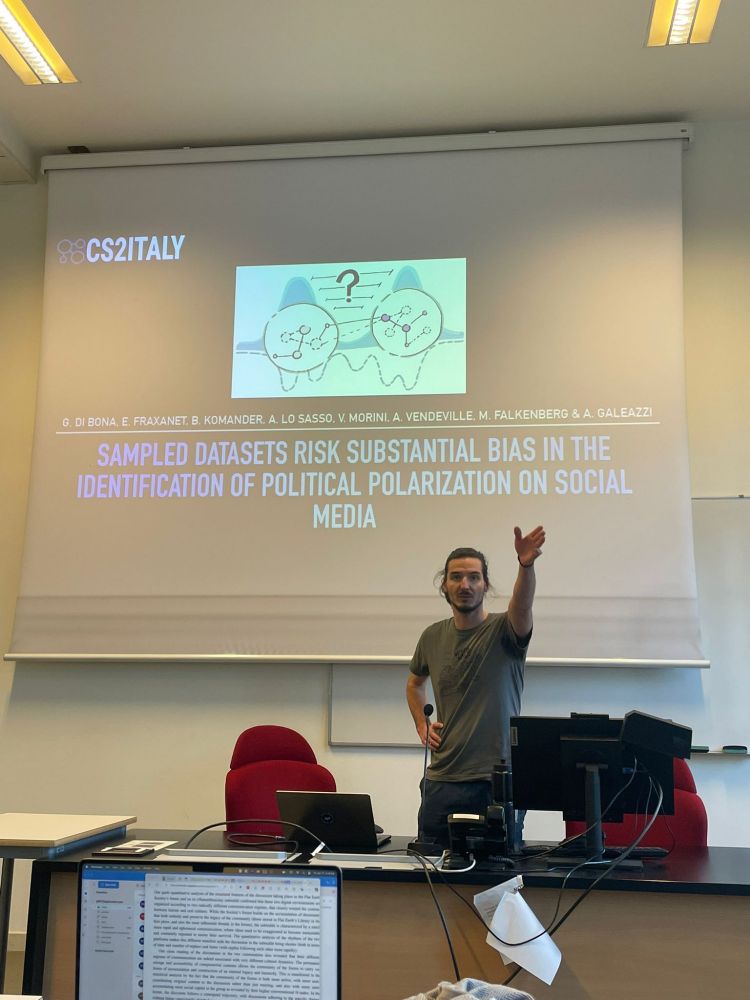Central European University & Institute for Sustainable Resources, UCL.
maxfalkenberg.com
Solid 6/10 presentation - would collaborate again 😅

Solid 6/10 presentation - would collaborate again 😅
In 8 of 9 countries, toxic posts receive substantially less engagement. However, we have no way of knowing if this is an authentic result, or algorithm driven...

In 8 of 9 countries, toxic posts receive substantially less engagement. However, we have no way of knowing if this is an authentic result, or algorithm driven...
In each of the countries studied, political out-group mentions are common and significantly more toxic than in-group mentions. This is true on both the political right and the left!

In each of the countries studied, political out-group mentions are common and significantly more toxic than in-group mentions. This is true on both the political right and the left!
Our data shows that the vast majority of interactions are with political allies (structural polarization / homophily).

Our data shows that the vast majority of interactions are with political allies (structural polarization / homophily).
Our new research published today shows how political abuse on X is a global, widespread, and cross-partisan phenomenon.
Out now in Nature Communications: www.nature.com/articles/s41...
Key results🧵

Our new research published today shows how political abuse on X is a global, widespread, and cross-partisan phenomenon.
Out now in Nature Communications: www.nature.com/articles/s41...
Key results🧵
The stricter we limit changes in exposure, the fewer banks need to withdraw from FFs to enable a transition from inefficient to efficient phase out of lending.

The stricter we limit changes in exposure, the fewer banks need to withdraw from FFs to enable a transition from inefficient to efficient phase out of lending.
Existing regulations are not enough - they limit the fossil fuel assets a bank can hold, but do not restrict finance substitution or opportunistic behaviour.
US and Canadian banks are heavily exposed but Japanese banks have loads of headroom to continue lending

Existing regulations are not enough - they limit the fossil fuel assets a bank can hold, but do not restrict finance substitution or opportunistic behaviour.
US and Canadian banks are heavily exposed but Japanese banks have loads of headroom to continue lending
We say that this generates an "efficiency gap": The value of impacted deals vastly exceeds failed deals.

We say that this generates an "efficiency gap": The value of impacted deals vastly exceeds failed deals.
Major banks in Europe have reduced their lending...
But, the withdrawal of finance has been replaced by finance from other banks, mainly in Canada and Japan!
The finance has been "substituted"!

Major banks in Europe have reduced their lending...
But, the withdrawal of finance has been replaced by finance from other banks, mainly in Canada and Japan!
The finance has been "substituted"!
Most of the deals involve syndicates - a group of partner banks sharing risk.
Across that period, underwriting has remained stable, averaging $584bn before Paris agreement and $592bn post-Paris.

Most of the deals involve syndicates - a group of partner banks sharing risk.
Across that period, underwriting has remained stable, averaging $584bn before Paris agreement and $592bn post-Paris.
We provide 400m+ user interactions and 1.4m user profiles for the microblogging platform Koo which has gained traction in India, Brazil and Nigeria.
Paper: arxiv.org/abs/2401.07599
Data: zenodo.org/records/10476212

We provide 400m+ user interactions and 1.4m user profiles for the microblogging platform Koo which has gained traction in India, Brazil and Nigeria.
Paper: arxiv.org/abs/2401.07599
Data: zenodo.org/records/10476212
Finally, we find a common ally-enemy structure in how the left and right interact with each other, relative to how they interact with apolitical accounts...

Finally, we find a common ally-enemy structure in how the left and right interact with each other, relative to how they interact with apolitical accounts...
Most of these interactions are unidirectional. Out-group conversation is rare...

Most of these interactions are unidirectional. Out-group conversation is rare...

osf.io/preprints/ps...
With @baronca.bsky.social @jurgenpfeffer.bsky.social and others.
Some highlights 👇

osf.io/preprints/ps...
With @baronca.bsky.social @jurgenpfeffer.bsky.social and others.
Some highlights 👇
Toxicity of posts authored by the far right as a function of whether the targeted user is mainly quote tweeted or retweeted. And of course Dems are the main group being heavily quote tweeted...
From doi.org/10.1093/pnas...


Toxicity of posts authored by the far right as a function of whether the targeted user is mainly quote tweeted or retweeted. And of course Dems are the main group being heavily quote tweeted...
From doi.org/10.1093/pnas...



The blue line is for the verified cohort of users active on Gettr but banned from Twitter. The green line is for those still active on Twitter. The orange for unverified users.
Rogan criticised the platform at the dashed line...

The blue line is for the verified cohort of users active on Gettr but banned from Twitter. The green line is for those still active on Twitter. The orange for unverified users.
Rogan criticised the platform at the dashed line...

